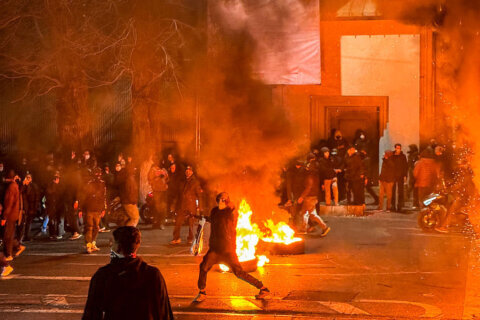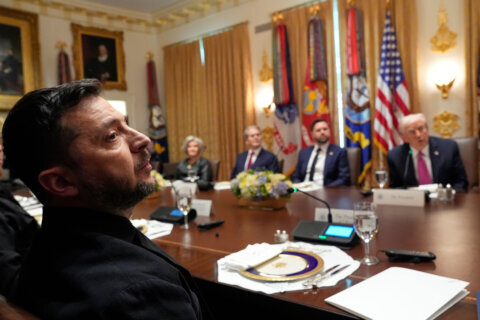WASHINGTON — Airstrikes resumed in Yemen’s capital of Sanaa on Sunday, reviving fears the country is slipping further into the clutches of a long, brutal war that may alter the map of the region.
Just days after the Saudi government announced its military campaign designed to wrest control of the country from Houthi rebels ended, new Saudi-led attacks have reignited fears the country will never reunite as one again.
“We’re holding by a thread,” said a top Yemeni official in Washington, after the bombing campaign began in late March.
But the short, staccato responses to questions — via email, from Mohammed Albasha, spokesman at the Yemeni Embassy in Washington — hinted that the thread could snap at any time.
Seeming to sense the impending death, destruction and displacement coming to Yemen, Albasha said, “pray for us.”
The Houthi rebels had chased Yemen’s President Abd Rabbah Mansur Hadi out of the country.
In his absence, very little substantive information is coming out of what’s left of his government.
“I’m no longer getting any press guidance so I don’t know what else to tell you,” said Albasha, in response to questions about the situation in Yemen.
U.S. intelligence sources suggest the fighting in Yemen, and perhaps eventual spillover to neighboring countries, could last an entire decade or longer.
“I think this is more than generational,” said Robert Baer, former Central Intelligence Agency operative. “I was talking with someone who deals with this every day in intelligence — an Arab — and he’s wondering if this isn’t going to spread into Saudi Arabia.”
The Houthi rebels have decried the Saudi intervention, claiming that its fight with the Yemeni government is an internal matter for the sovereign country to solve.
But Retired U.S. Army Gen. Michael T. Flynn, former Director of the Defense Intelligence Agency, questions the assertion that Yemen is still a sovereign country.
“Is Yemen still a sovereign nation? The guy that was in charge is no longer in charge. Are the borders still borders? Sovereignty only matters if you are a nation-state; fully functioning, with a government, whether that government is a monarchy, a dictatorship or a republic as ours is.”
In Flynn’s view, Yemen meets none of those criteria and is a virtually lawless place that’s a danger to the region.
“I think this is why the Saudis have reacted so strongly because they’re afraid for their own security,” said Baer.
In addition to Saudi military activity in Yemen, according to intelligence sources in the region, Iran has backed the Houthi rebels with weapons and advisers.
Some experienced observers of the conflict believe the outside regional activity was triggered by a signal the U.S. sent in September of 2013. The U.S. decision to not take military action against the Assad regime after it used chemical weapons in Syria seemed to send a blunt message to regional powers.
“My preference would have been that the international community already would have acted,” President Barack Obama, said while speaking to Baltic leaders at the White House.
Some experts believe that message was interpreted by Iran and Saudi Arabia to mean they needed to play a greater role in working out conflicts in their own region. As a result they may now be locked in a proxy war that could last a generation or more. Their aggressive responses have triggered substantial concern among intelligence experts.
“It’s really a dangerous situation that we’re seeing. What we’re really witnessing is a breakdown of order in the Middle East,” said Flynn.
That breakdown, he says, is an existential threat to Yemen as the nation we know. He and other Middle East experts question whether the country can withstand the internal tensions and external influence.
“Saudi Arabia is now conducting air attacks inside of Yemen. That escalation of conflict in the Middle East means they see a threat — and they’re acting in their self-interest,” said Flynn.
Flynn said he believes the airstrikes are “a big deal” and the result could be a protracted war because, “Iran has issued something of a warning to the Saudis, and it’s something we all need to pay attention to.”
“It’s not clear when, where or for how long the Saudi-led coalition will launch military strikes,” but Albasha said claims the statement that the strikes were over last week “was a huge misunderstanding.”
“The military campaign didn’t end, nor was a cease-fire announced, they moved on to phase two of kinetic actions basically targeting rebel movement and implementing force protection for paramilitary units loyal to the President versus hitting only brick and mortar targets,” said Albasha.
There are reports the Yemeni government and Houthis are trying to start peace talks, but both sides appear reluctant. In the meantime, U.S. concerns about the activity of terror group al-Qaida in the Arabian Peninsula (AQAP) persist.
“We’ve always said we will continue to closely monitor terrorist threats posed by AQAP and others and to take action if necessary to disrupt continuing imminent threats to our citizens and others,” said White House National Security Council spokesman Alistair Baskey.
Albasha said, AQAP at the moment is “looting banks and arms depots, capturing military equipment and public properties.”
Some of those properties include airports.
The worry, according to U.S. intelligence sources, is that AQAP pioneered the development and deployment of small, concealable explosive devices. Air cargo is AQAP’s preferred method of delivery.
Some intelligence sources believe the confluence of problems, including a civil war, growing sectarianism, terror groups AQAP and ISIL seeking to assert themselves and dwindling natural resources may lead to the death of Yemen as a unified nation.








